Criminal Law Module: Analyzing Insanity and Automatism in Alf's Case
VerifiedAdded on 2023/03/29
|11
|3083
|302
Homework Assignment
AI Summary
This criminal law assignment analyzes a case where the defendant, Alf, is accused of strangling his girlfriend. The assignment focuses on two potential defenses: insanity and automatism. Part 1 examines the insanity defense, applying the M'Naghten rule and considering whether Alf's blood disorder and medication impacted his mental state to the extent that he could not understand the nature of his actions or that they were wrong. Part 2 explores the automatism defense, determining if Alf's actions were involuntary due to his condition and medication, and whether this constitutes a complete defense. The analysis considers relevant case law and the application of legal principles to the facts, ultimately concluding whether Alf is likely to succeed in either defense.
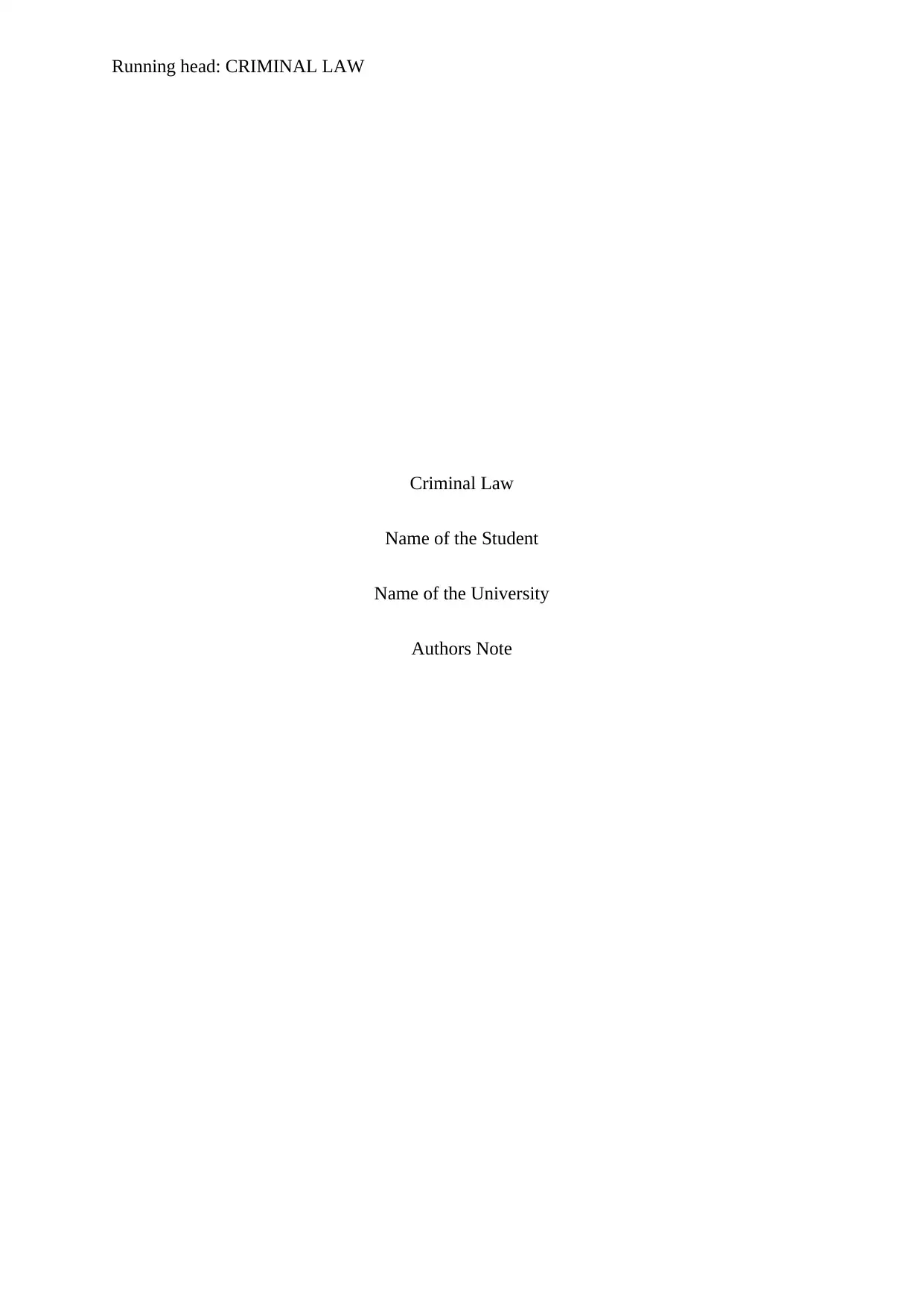
Running head: CRIMINAL LAW
Criminal Law
Name of the Student
Name of the University
Authors Note
Criminal Law
Name of the Student
Name of the University
Authors Note
Paraphrase This Document
Need a fresh take? Get an instant paraphrase of this document with our AI Paraphraser
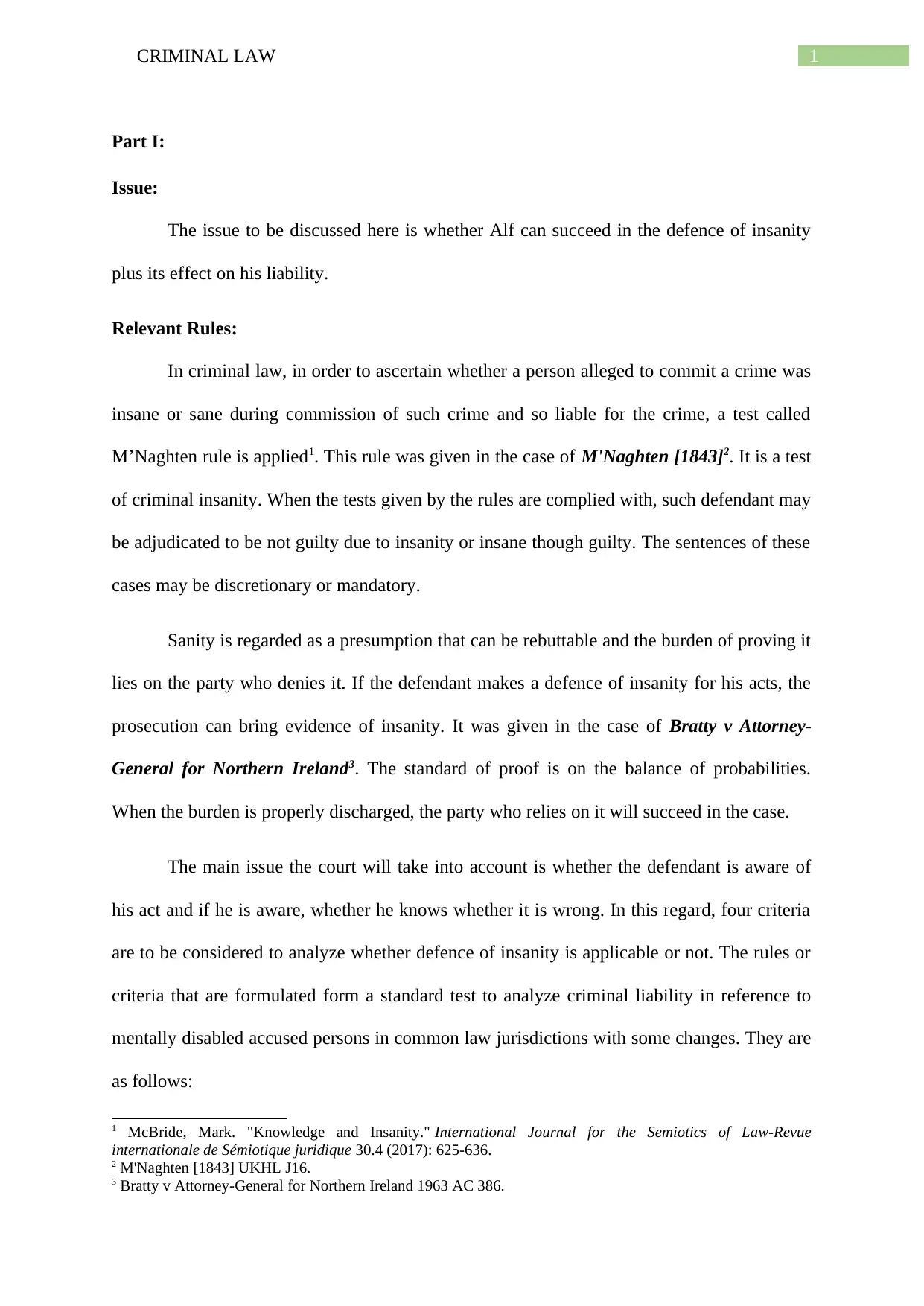
1CRIMINAL LAW
Part I:
Issue:
The issue to be discussed here is whether Alf can succeed in the defence of insanity
plus its effect on his liability.
Relevant Rules:
In criminal law, in order to ascertain whether a person alleged to commit a crime was
insane or sane during commission of such crime and so liable for the crime, a test called
M’Naghten rule is applied1. This rule was given in the case of M'Naghten [1843]2. It is a test
of criminal insanity. When the tests given by the rules are complied with, such defendant may
be adjudicated to be not guilty due to insanity or insane though guilty. The sentences of these
cases may be discretionary or mandatory.
Sanity is regarded as a presumption that can be rebuttable and the burden of proving it
lies on the party who denies it. If the defendant makes a defence of insanity for his acts, the
prosecution can bring evidence of insanity. It was given in the case of Bratty v Attorney-
General for Northern Ireland3. The standard of proof is on the balance of probabilities.
When the burden is properly discharged, the party who relies on it will succeed in the case.
The main issue the court will take into account is whether the defendant is aware of
his act and if he is aware, whether he knows whether it is wrong. In this regard, four criteria
are to be considered to analyze whether defence of insanity is applicable or not. The rules or
criteria that are formulated form a standard test to analyze criminal liability in reference to
mentally disabled accused persons in common law jurisdictions with some changes. They are
as follows:
1 McBride, Mark. "Knowledge and Insanity." International Journal for the Semiotics of Law-Revue
internationale de Sémiotique juridique 30.4 (2017): 625-636.
2 M'Naghten [1843] UKHL J16.
3 Bratty v Attorney-General for Northern Ireland 1963 AC 386.
Part I:
Issue:
The issue to be discussed here is whether Alf can succeed in the defence of insanity
plus its effect on his liability.
Relevant Rules:
In criminal law, in order to ascertain whether a person alleged to commit a crime was
insane or sane during commission of such crime and so liable for the crime, a test called
M’Naghten rule is applied1. This rule was given in the case of M'Naghten [1843]2. It is a test
of criminal insanity. When the tests given by the rules are complied with, such defendant may
be adjudicated to be not guilty due to insanity or insane though guilty. The sentences of these
cases may be discretionary or mandatory.
Sanity is regarded as a presumption that can be rebuttable and the burden of proving it
lies on the party who denies it. If the defendant makes a defence of insanity for his acts, the
prosecution can bring evidence of insanity. It was given in the case of Bratty v Attorney-
General for Northern Ireland3. The standard of proof is on the balance of probabilities.
When the burden is properly discharged, the party who relies on it will succeed in the case.
The main issue the court will take into account is whether the defendant is aware of
his act and if he is aware, whether he knows whether it is wrong. In this regard, four criteria
are to be considered to analyze whether defence of insanity is applicable or not. The rules or
criteria that are formulated form a standard test to analyze criminal liability in reference to
mentally disabled accused persons in common law jurisdictions with some changes. They are
as follows:
1 McBride, Mark. "Knowledge and Insanity." International Journal for the Semiotics of Law-Revue
internationale de Sémiotique juridique 30.4 (2017): 625-636.
2 M'Naghten [1843] UKHL J16.
3 Bratty v Attorney-General for Northern Ireland 1963 AC 386.
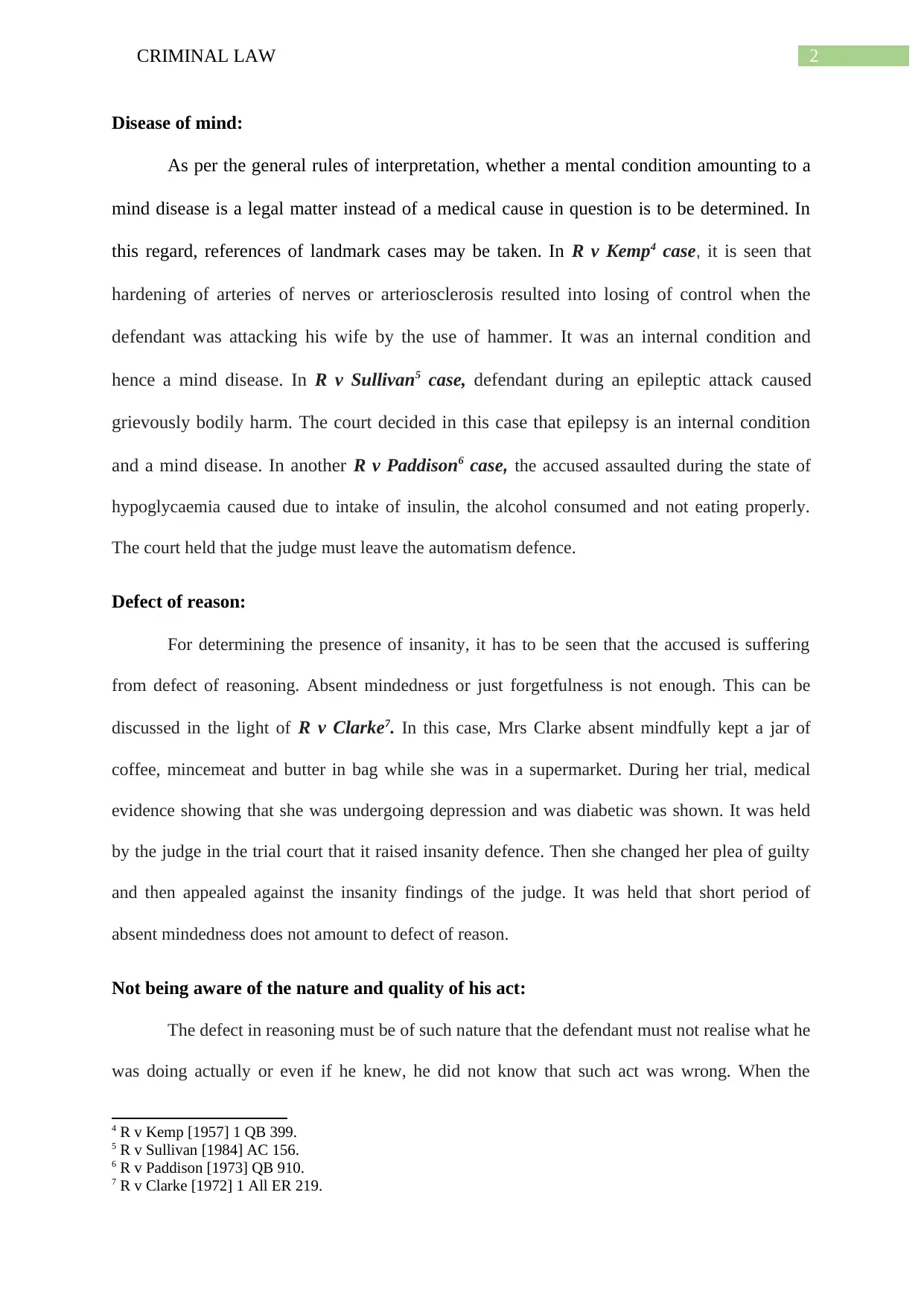
2CRIMINAL LAW
Disease of mind:
As per the general rules of interpretation, whether a mental condition amounting to a
mind disease is a legal matter instead of a medical cause in question is to be determined. In
this regard, references of landmark cases may be taken. In R v Kemp4 case, it is seen that
hardening of arteries of nerves or arteriosclerosis resulted into losing of control when the
defendant was attacking his wife by the use of hammer. It was an internal condition and
hence a mind disease. In R v Sullivan5 case, defendant during an epileptic attack caused
grievously bodily harm. The court decided in this case that epilepsy is an internal condition
and a mind disease. In another R v Paddison6 case, the accused assaulted during the state of
hypoglycaemia caused due to intake of insulin, the alcohol consumed and not eating properly.
The court held that the judge must leave the automatism defence.
Defect of reason:
For determining the presence of insanity, it has to be seen that the accused is suffering
from defect of reasoning. Absent mindedness or just forgetfulness is not enough. This can be
discussed in the light of R v Clarke7. In this case, Mrs Clarke absent mindfully kept a jar of
coffee, mincemeat and butter in bag while she was in a supermarket. During her trial, medical
evidence showing that she was undergoing depression and was diabetic was shown. It was held
by the judge in the trial court that it raised insanity defence. Then she changed her plea of guilty
and then appealed against the insanity findings of the judge. It was held that short period of
absent mindedness does not amount to defect of reason.
Not being aware of the nature and quality of his act:
The defect in reasoning must be of such nature that the defendant must not realise what he
was doing actually or even if he knew, he did not know that such act was wrong. When the
4 R v Kemp [1957] 1 QB 399.
5 R v Sullivan [1984] AC 156.
6 R v Paddison [1973] QB 910.
7 R v Clarke [1972] 1 All ER 219.
Disease of mind:
As per the general rules of interpretation, whether a mental condition amounting to a
mind disease is a legal matter instead of a medical cause in question is to be determined. In
this regard, references of landmark cases may be taken. In R v Kemp4 case, it is seen that
hardening of arteries of nerves or arteriosclerosis resulted into losing of control when the
defendant was attacking his wife by the use of hammer. It was an internal condition and
hence a mind disease. In R v Sullivan5 case, defendant during an epileptic attack caused
grievously bodily harm. The court decided in this case that epilepsy is an internal condition
and a mind disease. In another R v Paddison6 case, the accused assaulted during the state of
hypoglycaemia caused due to intake of insulin, the alcohol consumed and not eating properly.
The court held that the judge must leave the automatism defence.
Defect of reason:
For determining the presence of insanity, it has to be seen that the accused is suffering
from defect of reasoning. Absent mindedness or just forgetfulness is not enough. This can be
discussed in the light of R v Clarke7. In this case, Mrs Clarke absent mindfully kept a jar of
coffee, mincemeat and butter in bag while she was in a supermarket. During her trial, medical
evidence showing that she was undergoing depression and was diabetic was shown. It was held
by the judge in the trial court that it raised insanity defence. Then she changed her plea of guilty
and then appealed against the insanity findings of the judge. It was held that short period of
absent mindedness does not amount to defect of reason.
Not being aware of the nature and quality of his act:
The defect in reasoning must be of such nature that the defendant must not realise what he
was doing actually or even if he knew, he did not know that such act was wrong. When the
4 R v Kemp [1957] 1 QB 399.
5 R v Sullivan [1984] AC 156.
6 R v Paddison [1973] QB 910.
7 R v Clarke [1972] 1 All ER 219.
⊘ This is a preview!⊘
Do you want full access?
Subscribe today to unlock all pages.

Trusted by 1+ million students worldwide
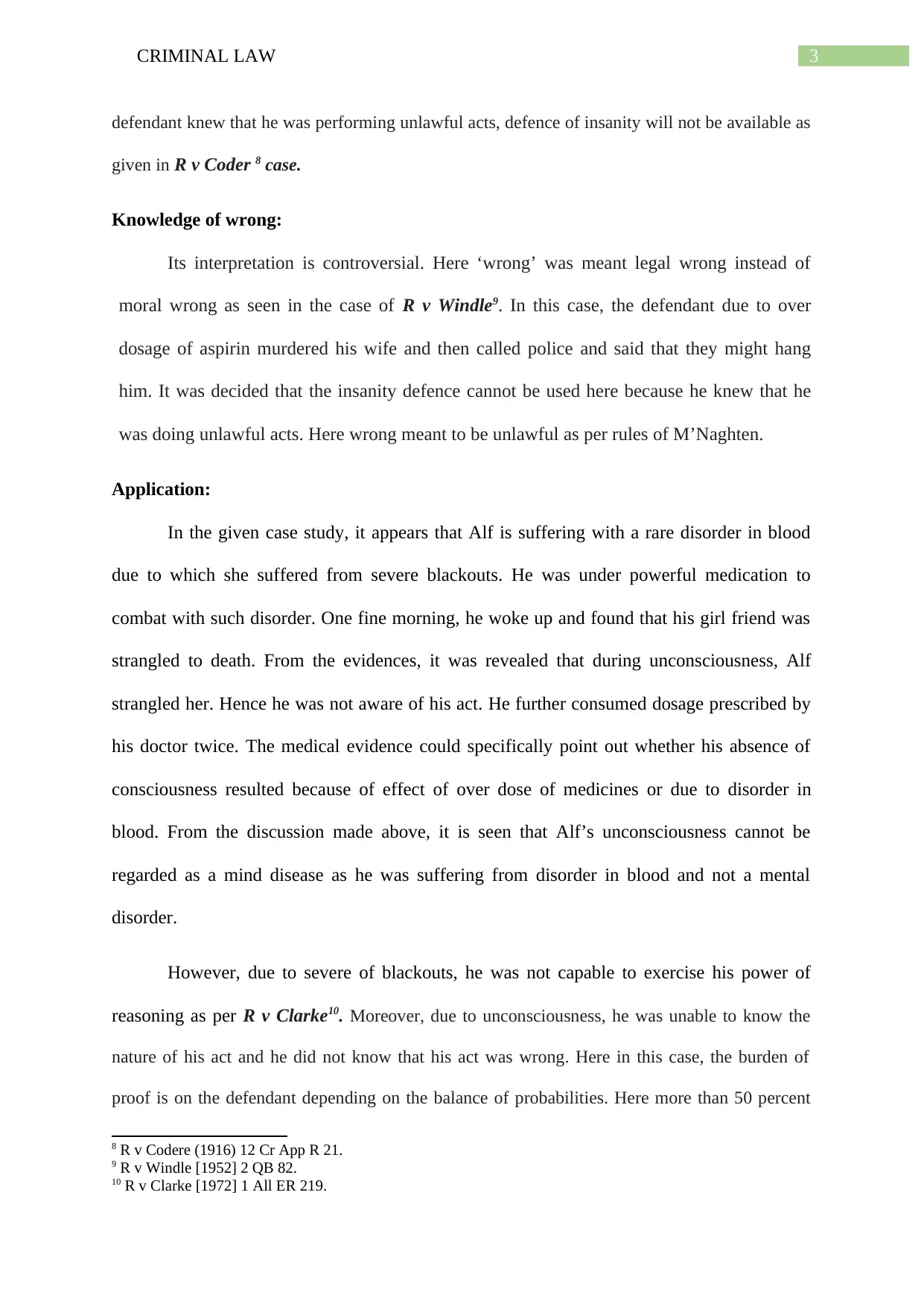
3CRIMINAL LAW
defendant knew that he was performing unlawful acts, defence of insanity will not be available as
given in R v Coder 8 case.
Knowledge of wrong:
Its interpretation is controversial. Here ‘wrong’ was meant legal wrong instead of
moral wrong as seen in the case of R v Windle9. In this case, the defendant due to over
dosage of aspirin murdered his wife and then called police and said that they might hang
him. It was decided that the insanity defence cannot be used here because he knew that he
was doing unlawful acts. Here wrong meant to be unlawful as per rules of M’Naghten.
Application:
In the given case study, it appears that Alf is suffering with a rare disorder in blood
due to which she suffered from severe blackouts. He was under powerful medication to
combat with such disorder. One fine morning, he woke up and found that his girl friend was
strangled to death. From the evidences, it was revealed that during unconsciousness, Alf
strangled her. Hence he was not aware of his act. He further consumed dosage prescribed by
his doctor twice. The medical evidence could specifically point out whether his absence of
consciousness resulted because of effect of over dose of medicines or due to disorder in
blood. From the discussion made above, it is seen that Alf’s unconsciousness cannot be
regarded as a mind disease as he was suffering from disorder in blood and not a mental
disorder.
However, due to severe of blackouts, he was not capable to exercise his power of
reasoning as per R v Clarke10. Moreover, due to unconsciousness, he was unable to know the
nature of his act and he did not know that his act was wrong. Here in this case, the burden of
proof is on the defendant depending on the balance of probabilities. Here more than 50 percent
8 R v Codere (1916) 12 Cr App R 21.
9 R v Windle [1952] 2 QB 82.
10 R v Clarke [1972] 1 All ER 219.
defendant knew that he was performing unlawful acts, defence of insanity will not be available as
given in R v Coder 8 case.
Knowledge of wrong:
Its interpretation is controversial. Here ‘wrong’ was meant legal wrong instead of
moral wrong as seen in the case of R v Windle9. In this case, the defendant due to over
dosage of aspirin murdered his wife and then called police and said that they might hang
him. It was decided that the insanity defence cannot be used here because he knew that he
was doing unlawful acts. Here wrong meant to be unlawful as per rules of M’Naghten.
Application:
In the given case study, it appears that Alf is suffering with a rare disorder in blood
due to which she suffered from severe blackouts. He was under powerful medication to
combat with such disorder. One fine morning, he woke up and found that his girl friend was
strangled to death. From the evidences, it was revealed that during unconsciousness, Alf
strangled her. Hence he was not aware of his act. He further consumed dosage prescribed by
his doctor twice. The medical evidence could specifically point out whether his absence of
consciousness resulted because of effect of over dose of medicines or due to disorder in
blood. From the discussion made above, it is seen that Alf’s unconsciousness cannot be
regarded as a mind disease as he was suffering from disorder in blood and not a mental
disorder.
However, due to severe of blackouts, he was not capable to exercise his power of
reasoning as per R v Clarke10. Moreover, due to unconsciousness, he was unable to know the
nature of his act and he did not know that his act was wrong. Here in this case, the burden of
proof is on the defendant depending on the balance of probabilities. Here more than 50 percent
8 R v Codere (1916) 12 Cr App R 21.
9 R v Windle [1952] 2 QB 82.
10 R v Clarke [1972] 1 All ER 219.
Paraphrase This Document
Need a fresh take? Get an instant paraphrase of this document with our AI Paraphraser
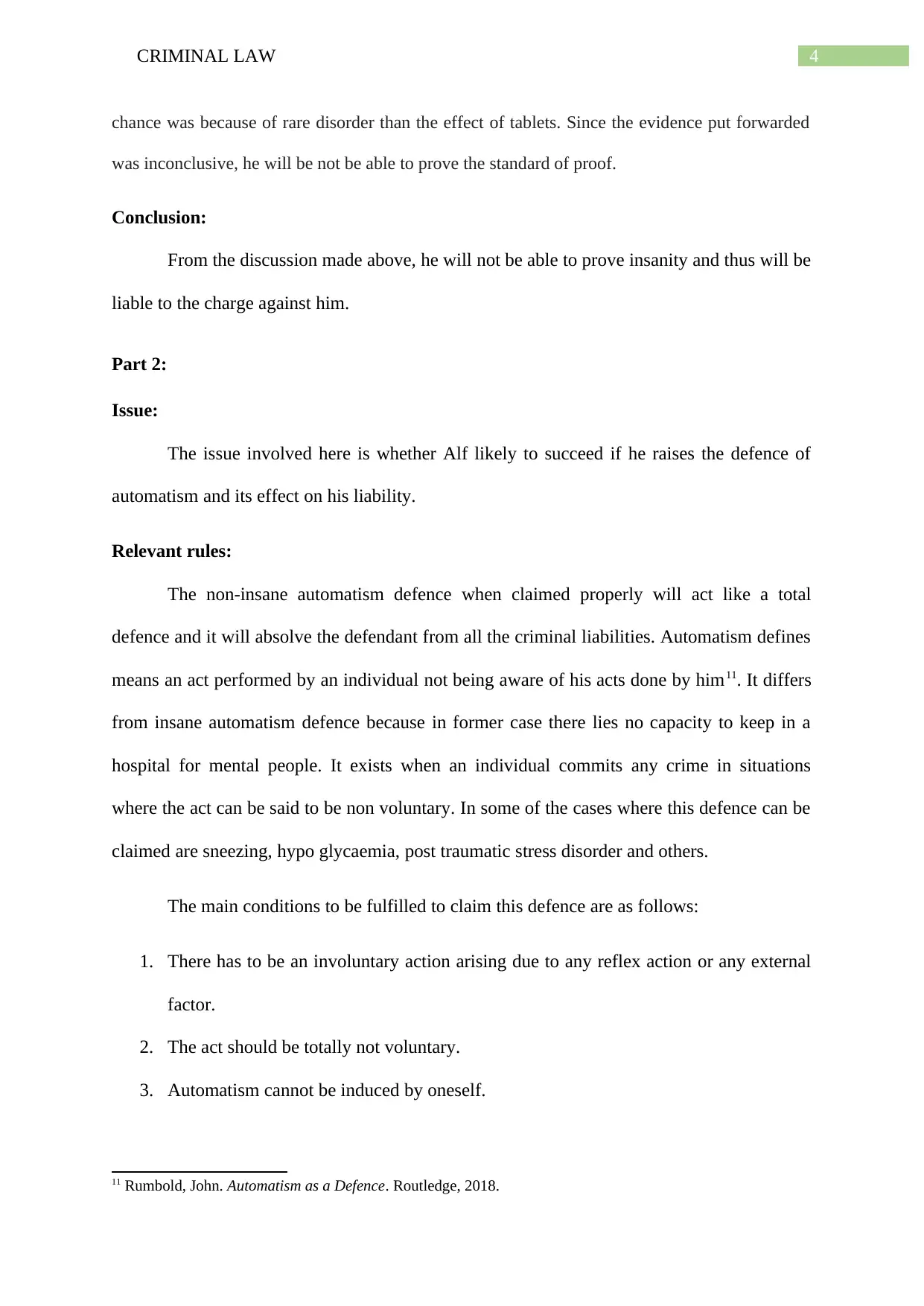
4CRIMINAL LAW
chance was because of rare disorder than the effect of tablets. Since the evidence put forwarded
was inconclusive, he will be not be able to prove the standard of proof.
Conclusion:
From the discussion made above, he will not be able to prove insanity and thus will be
liable to the charge against him.
Part 2:
Issue:
The issue involved here is whether Alf likely to succeed if he raises the defence of
automatism and its effect on his liability.
Relevant rules:
The non-insane automatism defence when claimed properly will act like a total
defence and it will absolve the defendant from all the criminal liabilities. Automatism defines
means an act performed by an individual not being aware of his acts done by him11. It differs
from insane automatism defence because in former case there lies no capacity to keep in a
hospital for mental people. It exists when an individual commits any crime in situations
where the act can be said to be non voluntary. In some of the cases where this defence can be
claimed are sneezing, hypo glycaemia, post traumatic stress disorder and others.
The main conditions to be fulfilled to claim this defence are as follows:
1. There has to be an involuntary action arising due to any reflex action or any external
factor.
2. The act should be totally not voluntary.
3. Automatism cannot be induced by oneself.
11 Rumbold, John. Automatism as a Defence. Routledge, 2018.
chance was because of rare disorder than the effect of tablets. Since the evidence put forwarded
was inconclusive, he will be not be able to prove the standard of proof.
Conclusion:
From the discussion made above, he will not be able to prove insanity and thus will be
liable to the charge against him.
Part 2:
Issue:
The issue involved here is whether Alf likely to succeed if he raises the defence of
automatism and its effect on his liability.
Relevant rules:
The non-insane automatism defence when claimed properly will act like a total
defence and it will absolve the defendant from all the criminal liabilities. Automatism defines
means an act performed by an individual not being aware of his acts done by him11. It differs
from insane automatism defence because in former case there lies no capacity to keep in a
hospital for mental people. It exists when an individual commits any crime in situations
where the act can be said to be non voluntary. In some of the cases where this defence can be
claimed are sneezing, hypo glycaemia, post traumatic stress disorder and others.
The main conditions to be fulfilled to claim this defence are as follows:
1. There has to be an involuntary action arising due to any reflex action or any external
factor.
2. The act should be totally not voluntary.
3. Automatism cannot be induced by oneself.
11 Rumbold, John. Automatism as a Defence. Routledge, 2018.
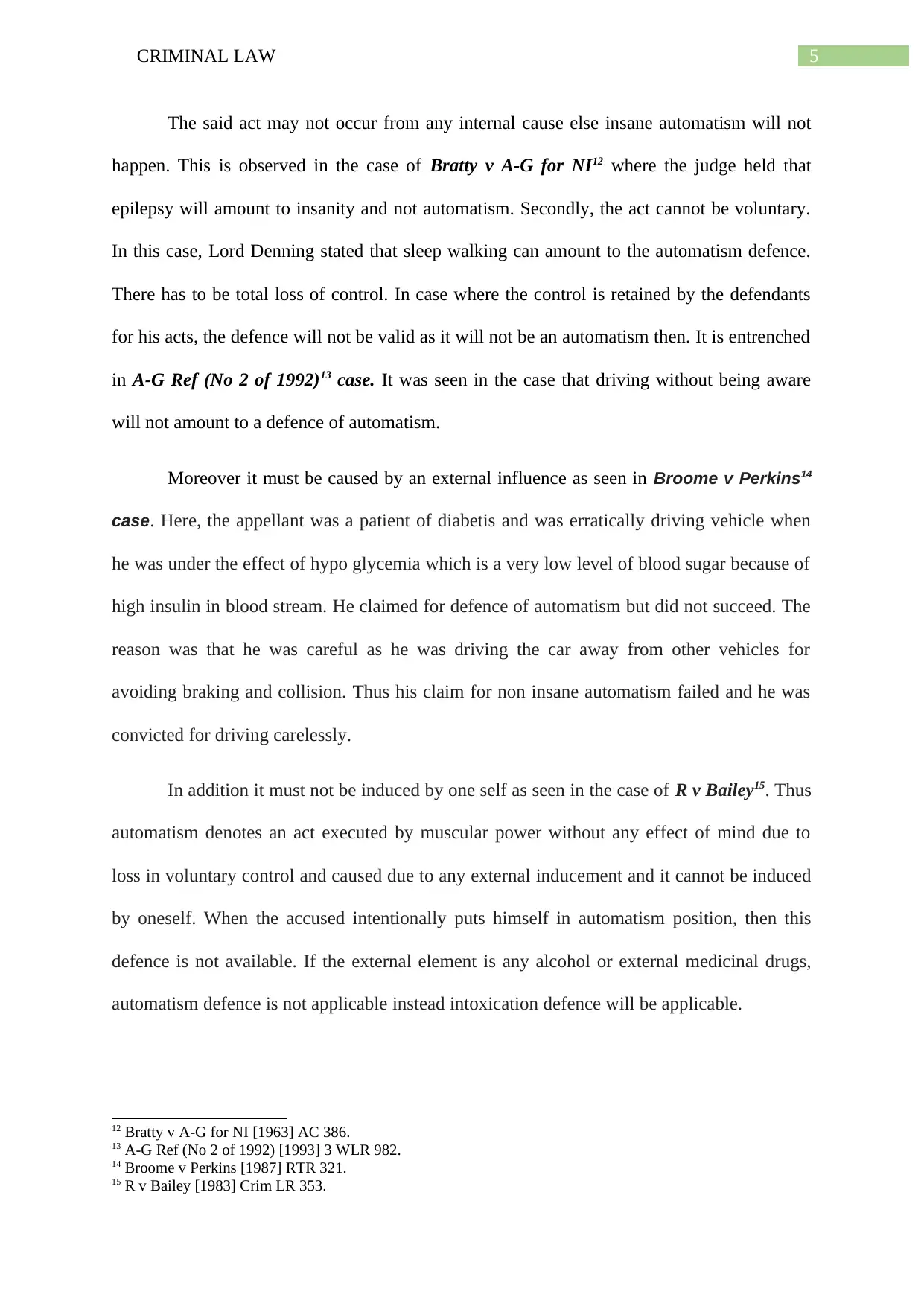
5CRIMINAL LAW
The said act may not occur from any internal cause else insane automatism will not
happen. This is observed in the case of Bratty v A-G for NI12 where the judge held that
epilepsy will amount to insanity and not automatism. Secondly, the act cannot be voluntary.
In this case, Lord Denning stated that sleep walking can amount to the automatism defence.
There has to be total loss of control. In case where the control is retained by the defendants
for his acts, the defence will not be valid as it will not be an automatism then. It is entrenched
in A-G Ref (No 2 of 1992)13 case. It was seen in the case that driving without being aware
will not amount to a defence of automatism.
Moreover it must be caused by an external influence as seen in Broome v Perkins14
case. Here, the appellant was a patient of diabetis and was erratically driving vehicle when
he was under the effect of hypo glycemia which is a very low level of blood sugar because of
high insulin in blood stream. He claimed for defence of automatism but did not succeed. The
reason was that he was careful as he was driving the car away from other vehicles for
avoiding braking and collision. Thus his claim for non insane automatism failed and he was
convicted for driving carelessly.
In addition it must not be induced by one self as seen in the case of R v Bailey15. Thus
automatism denotes an act executed by muscular power without any effect of mind due to
loss in voluntary control and caused due to any external inducement and it cannot be induced
by oneself. When the accused intentionally puts himself in automatism position, then this
defence is not available. If the external element is any alcohol or external medicinal drugs,
automatism defence is not applicable instead intoxication defence will be applicable.
12 Bratty v A-G for NI [1963] AC 386.
13 A-G Ref (No 2 of 1992) [1993] 3 WLR 982.
14 Broome v Perkins [1987] RTR 321.
15 R v Bailey [1983] Crim LR 353.
The said act may not occur from any internal cause else insane automatism will not
happen. This is observed in the case of Bratty v A-G for NI12 where the judge held that
epilepsy will amount to insanity and not automatism. Secondly, the act cannot be voluntary.
In this case, Lord Denning stated that sleep walking can amount to the automatism defence.
There has to be total loss of control. In case where the control is retained by the defendants
for his acts, the defence will not be valid as it will not be an automatism then. It is entrenched
in A-G Ref (No 2 of 1992)13 case. It was seen in the case that driving without being aware
will not amount to a defence of automatism.
Moreover it must be caused by an external influence as seen in Broome v Perkins14
case. Here, the appellant was a patient of diabetis and was erratically driving vehicle when
he was under the effect of hypo glycemia which is a very low level of blood sugar because of
high insulin in blood stream. He claimed for defence of automatism but did not succeed. The
reason was that he was careful as he was driving the car away from other vehicles for
avoiding braking and collision. Thus his claim for non insane automatism failed and he was
convicted for driving carelessly.
In addition it must not be induced by one self as seen in the case of R v Bailey15. Thus
automatism denotes an act executed by muscular power without any effect of mind due to
loss in voluntary control and caused due to any external inducement and it cannot be induced
by oneself. When the accused intentionally puts himself in automatism position, then this
defence is not available. If the external element is any alcohol or external medicinal drugs,
automatism defence is not applicable instead intoxication defence will be applicable.
12 Bratty v A-G for NI [1963] AC 386.
13 A-G Ref (No 2 of 1992) [1993] 3 WLR 982.
14 Broome v Perkins [1987] RTR 321.
15 R v Bailey [1983] Crim LR 353.
⊘ This is a preview!⊘
Do you want full access?
Subscribe today to unlock all pages.

Trusted by 1+ million students worldwide
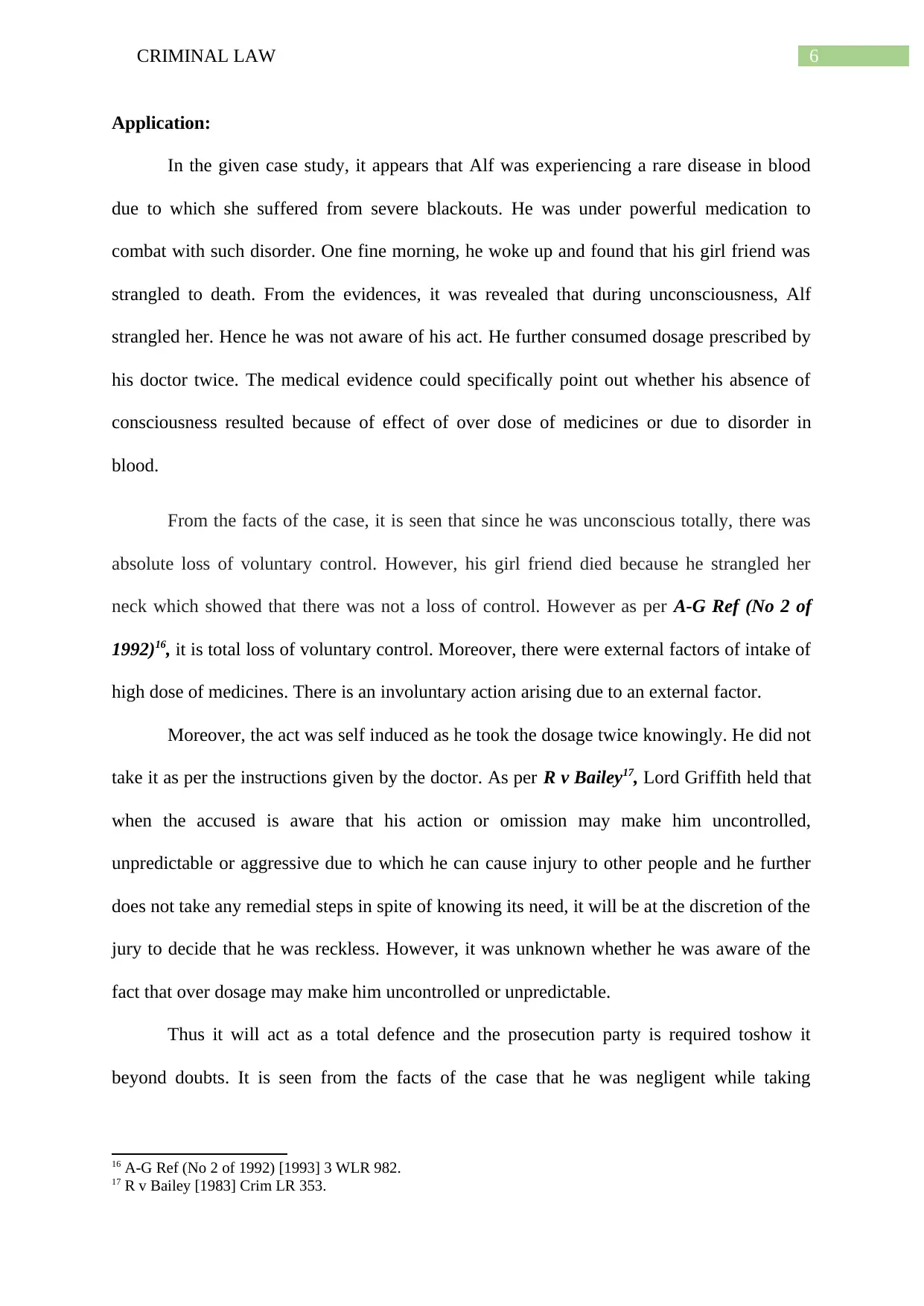
6CRIMINAL LAW
Application:
In the given case study, it appears that Alf was experiencing a rare disease in blood
due to which she suffered from severe blackouts. He was under powerful medication to
combat with such disorder. One fine morning, he woke up and found that his girl friend was
strangled to death. From the evidences, it was revealed that during unconsciousness, Alf
strangled her. Hence he was not aware of his act. He further consumed dosage prescribed by
his doctor twice. The medical evidence could specifically point out whether his absence of
consciousness resulted because of effect of over dose of medicines or due to disorder in
blood.
From the facts of the case, it is seen that since he was unconscious totally, there was
absolute loss of voluntary control. However, his girl friend died because he strangled her
neck which showed that there was not a loss of control. However as per A-G Ref (No 2 of
1992)16, it is total loss of voluntary control. Moreover, there were external factors of intake of
high dose of medicines. There is an involuntary action arising due to an external factor.
Moreover, the act was self induced as he took the dosage twice knowingly. He did not
take it as per the instructions given by the doctor. As per R v Bailey17, Lord Griffith held that
when the accused is aware that his action or omission may make him uncontrolled,
unpredictable or aggressive due to which he can cause injury to other people and he further
does not take any remedial steps in spite of knowing its need, it will be at the discretion of the
jury to decide that he was reckless. However, it was unknown whether he was aware of the
fact that over dosage may make him uncontrolled or unpredictable.
Thus it will act as a total defence and the prosecution party is required toshow it
beyond doubts. It is seen from the facts of the case that he was negligent while taking
16 A-G Ref (No 2 of 1992) [1993] 3 WLR 982.
17 R v Bailey [1983] Crim LR 353.
Application:
In the given case study, it appears that Alf was experiencing a rare disease in blood
due to which she suffered from severe blackouts. He was under powerful medication to
combat with such disorder. One fine morning, he woke up and found that his girl friend was
strangled to death. From the evidences, it was revealed that during unconsciousness, Alf
strangled her. Hence he was not aware of his act. He further consumed dosage prescribed by
his doctor twice. The medical evidence could specifically point out whether his absence of
consciousness resulted because of effect of over dose of medicines or due to disorder in
blood.
From the facts of the case, it is seen that since he was unconscious totally, there was
absolute loss of voluntary control. However, his girl friend died because he strangled her
neck which showed that there was not a loss of control. However as per A-G Ref (No 2 of
1992)16, it is total loss of voluntary control. Moreover, there were external factors of intake of
high dose of medicines. There is an involuntary action arising due to an external factor.
Moreover, the act was self induced as he took the dosage twice knowingly. He did not
take it as per the instructions given by the doctor. As per R v Bailey17, Lord Griffith held that
when the accused is aware that his action or omission may make him uncontrolled,
unpredictable or aggressive due to which he can cause injury to other people and he further
does not take any remedial steps in spite of knowing its need, it will be at the discretion of the
jury to decide that he was reckless. However, it was unknown whether he was aware of the
fact that over dosage may make him uncontrolled or unpredictable.
Thus it will act as a total defence and the prosecution party is required toshow it
beyond doubts. It is seen from the facts of the case that he was negligent while taking
16 A-G Ref (No 2 of 1992) [1993] 3 WLR 982.
17 R v Bailey [1983] Crim LR 353.
Paraphrase This Document
Need a fresh take? Get an instant paraphrase of this document with our AI Paraphraser
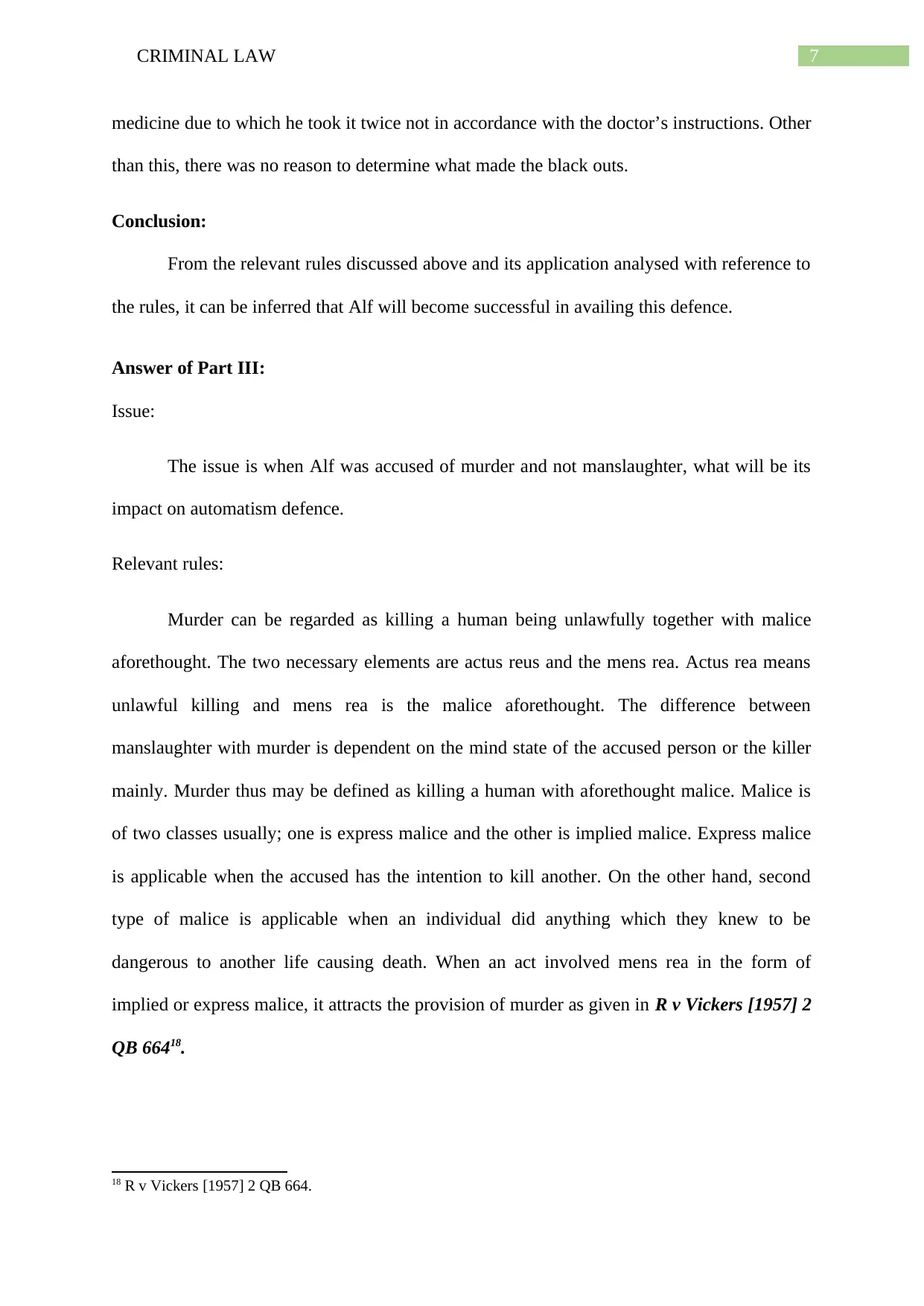
7CRIMINAL LAW
medicine due to which he took it twice not in accordance with the doctor’s instructions. Other
than this, there was no reason to determine what made the black outs.
Conclusion:
From the relevant rules discussed above and its application analysed with reference to
the rules, it can be inferred that Alf will become successful in availing this defence.
Answer of Part III:
Issue:
The issue is when Alf was accused of murder and not manslaughter, what will be its
impact on automatism defence.
Relevant rules:
Murder can be regarded as killing a human being unlawfully together with malice
aforethought. The two necessary elements are actus reus and the mens rea. Actus rea means
unlawful killing and mens rea is the malice aforethought. The difference between
manslaughter with murder is dependent on the mind state of the accused person or the killer
mainly. Murder thus may be defined as killing a human with aforethought malice. Malice is
of two classes usually; one is express malice and the other is implied malice. Express malice
is applicable when the accused has the intention to kill another. On the other hand, second
type of malice is applicable when an individual did anything which they knew to be
dangerous to another life causing death. When an act involved mens rea in the form of
implied or express malice, it attracts the provision of murder as given in R v Vickers [1957] 2
QB 66418.
18 R v Vickers [1957] 2 QB 664.
medicine due to which he took it twice not in accordance with the doctor’s instructions. Other
than this, there was no reason to determine what made the black outs.
Conclusion:
From the relevant rules discussed above and its application analysed with reference to
the rules, it can be inferred that Alf will become successful in availing this defence.
Answer of Part III:
Issue:
The issue is when Alf was accused of murder and not manslaughter, what will be its
impact on automatism defence.
Relevant rules:
Murder can be regarded as killing a human being unlawfully together with malice
aforethought. The two necessary elements are actus reus and the mens rea. Actus rea means
unlawful killing and mens rea is the malice aforethought. The difference between
manslaughter with murder is dependent on the mind state of the accused person or the killer
mainly. Murder thus may be defined as killing a human with aforethought malice. Malice is
of two classes usually; one is express malice and the other is implied malice. Express malice
is applicable when the accused has the intention to kill another. On the other hand, second
type of malice is applicable when an individual did anything which they knew to be
dangerous to another life causing death. When an act involved mens rea in the form of
implied or express malice, it attracts the provision of murder as given in R v Vickers [1957] 2
QB 66418.
18 R v Vickers [1957] 2 QB 664.
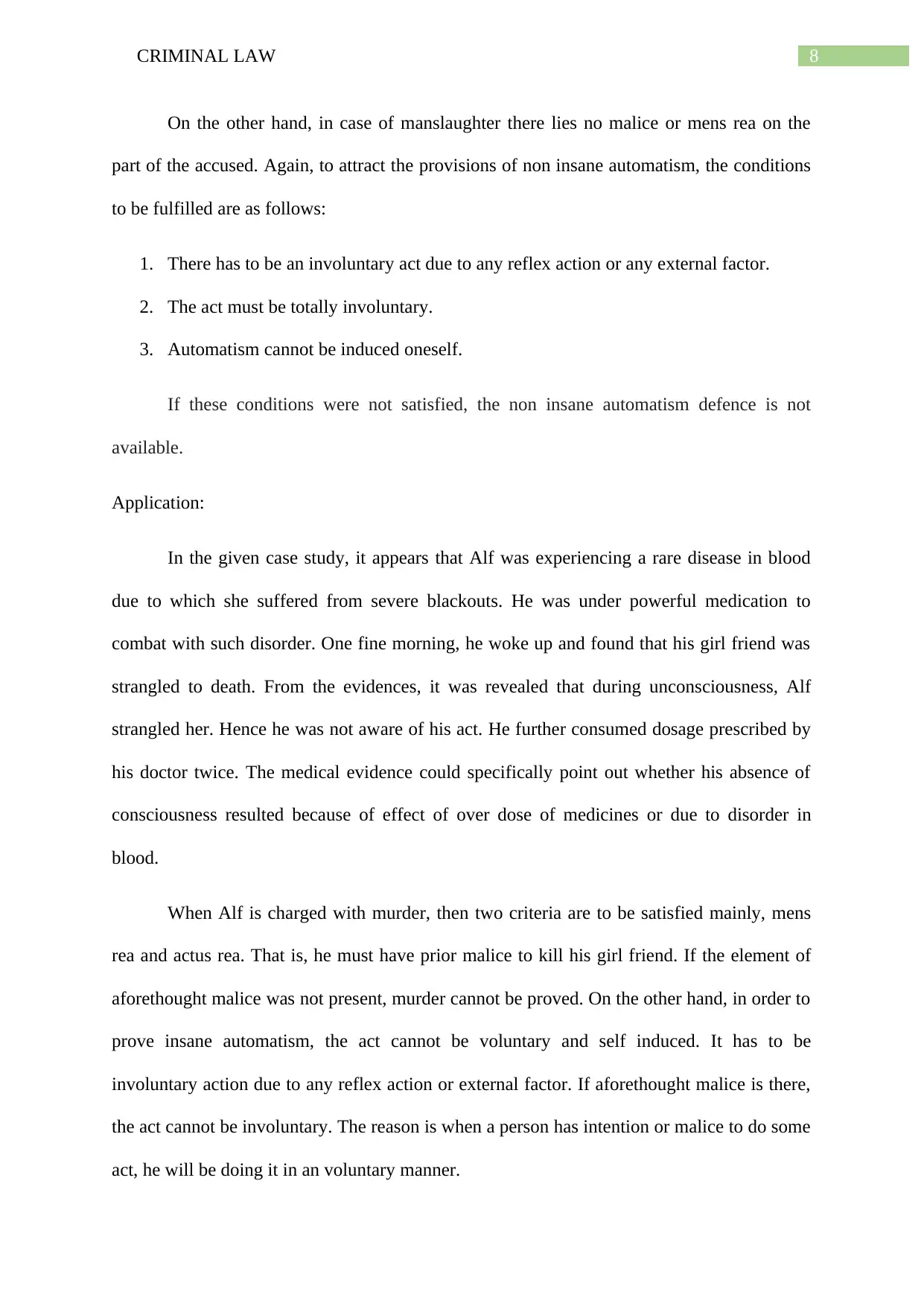
8CRIMINAL LAW
On the other hand, in case of manslaughter there lies no malice or mens rea on the
part of the accused. Again, to attract the provisions of non insane automatism, the conditions
to be fulfilled are as follows:
1. There has to be an involuntary act due to any reflex action or any external factor.
2. The act must be totally involuntary.
3. Automatism cannot be induced oneself.
If these conditions were not satisfied, the non insane automatism defence is not
available.
Application:
In the given case study, it appears that Alf was experiencing a rare disease in blood
due to which she suffered from severe blackouts. He was under powerful medication to
combat with such disorder. One fine morning, he woke up and found that his girl friend was
strangled to death. From the evidences, it was revealed that during unconsciousness, Alf
strangled her. Hence he was not aware of his act. He further consumed dosage prescribed by
his doctor twice. The medical evidence could specifically point out whether his absence of
consciousness resulted because of effect of over dose of medicines or due to disorder in
blood.
When Alf is charged with murder, then two criteria are to be satisfied mainly, mens
rea and actus rea. That is, he must have prior malice to kill his girl friend. If the element of
aforethought malice was not present, murder cannot be proved. On the other hand, in order to
prove insane automatism, the act cannot be voluntary and self induced. It has to be
involuntary action due to any reflex action or external factor. If aforethought malice is there,
the act cannot be involuntary. The reason is when a person has intention or malice to do some
act, he will be doing it in an voluntary manner.
On the other hand, in case of manslaughter there lies no malice or mens rea on the
part of the accused. Again, to attract the provisions of non insane automatism, the conditions
to be fulfilled are as follows:
1. There has to be an involuntary act due to any reflex action or any external factor.
2. The act must be totally involuntary.
3. Automatism cannot be induced oneself.
If these conditions were not satisfied, the non insane automatism defence is not
available.
Application:
In the given case study, it appears that Alf was experiencing a rare disease in blood
due to which she suffered from severe blackouts. He was under powerful medication to
combat with such disorder. One fine morning, he woke up and found that his girl friend was
strangled to death. From the evidences, it was revealed that during unconsciousness, Alf
strangled her. Hence he was not aware of his act. He further consumed dosage prescribed by
his doctor twice. The medical evidence could specifically point out whether his absence of
consciousness resulted because of effect of over dose of medicines or due to disorder in
blood.
When Alf is charged with murder, then two criteria are to be satisfied mainly, mens
rea and actus rea. That is, he must have prior malice to kill his girl friend. If the element of
aforethought malice was not present, murder cannot be proved. On the other hand, in order to
prove insane automatism, the act cannot be voluntary and self induced. It has to be
involuntary action due to any reflex action or external factor. If aforethought malice is there,
the act cannot be involuntary. The reason is when a person has intention or malice to do some
act, he will be doing it in an voluntary manner.
⊘ This is a preview!⊘
Do you want full access?
Subscribe today to unlock all pages.

Trusted by 1+ million students worldwide
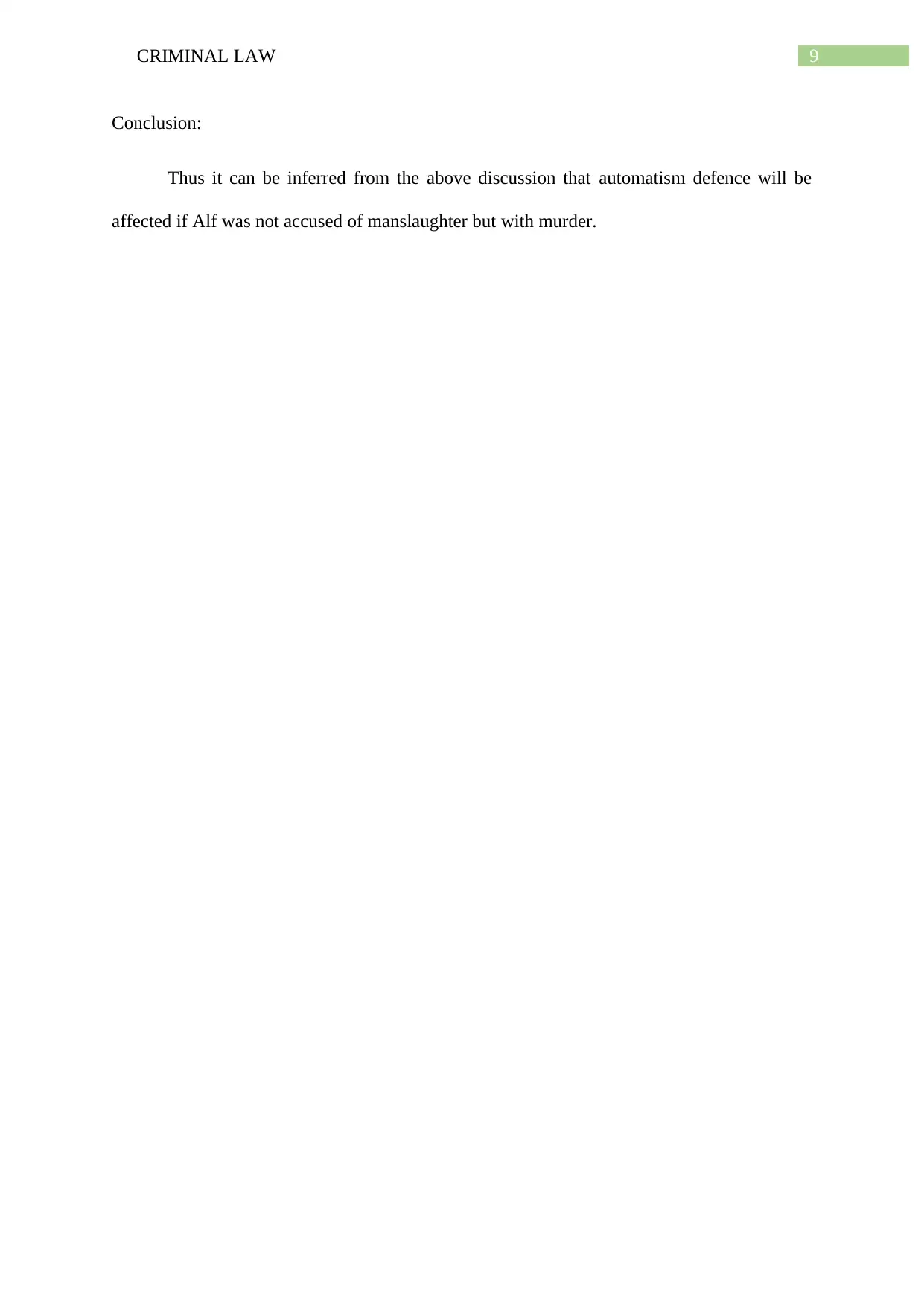
9CRIMINAL LAW
Conclusion:
Thus it can be inferred from the above discussion that automatism defence will be
affected if Alf was not accused of manslaughter but with murder.
Conclusion:
Thus it can be inferred from the above discussion that automatism defence will be
affected if Alf was not accused of manslaughter but with murder.
Paraphrase This Document
Need a fresh take? Get an instant paraphrase of this document with our AI Paraphraser
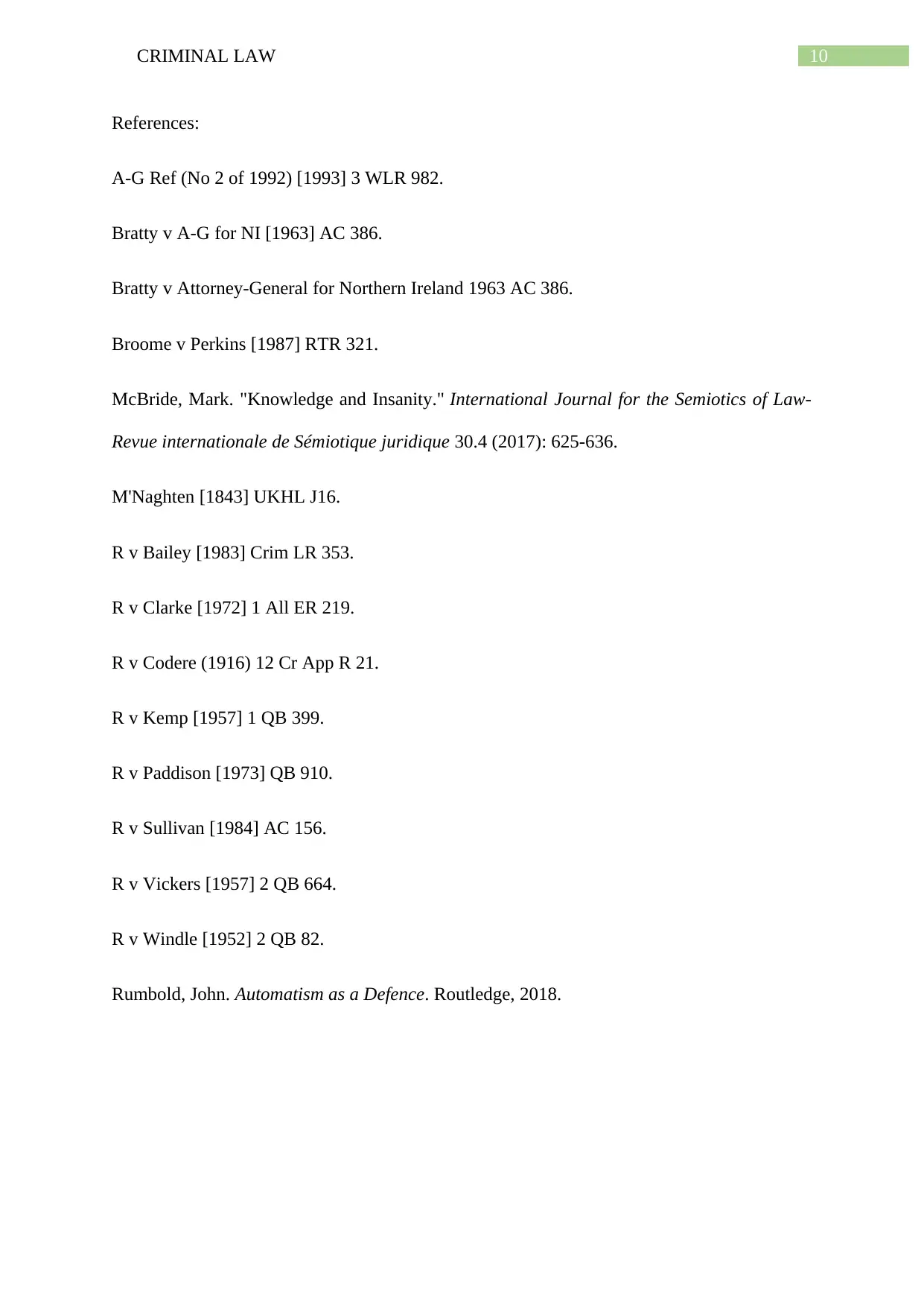
10CRIMINAL LAW
References:
A-G Ref (No 2 of 1992) [1993] 3 WLR 982.
Bratty v A-G for NI [1963] AC 386.
Bratty v Attorney-General for Northern Ireland 1963 AC 386.
Broome v Perkins [1987] RTR 321.
McBride, Mark. "Knowledge and Insanity." International Journal for the Semiotics of Law-
Revue internationale de Sémiotique juridique 30.4 (2017): 625-636.
M'Naghten [1843] UKHL J16.
R v Bailey [1983] Crim LR 353.
R v Clarke [1972] 1 All ER 219.
R v Codere (1916) 12 Cr App R 21.
R v Kemp [1957] 1 QB 399.
R v Paddison [1973] QB 910.
R v Sullivan [1984] AC 156.
R v Vickers [1957] 2 QB 664.
R v Windle [1952] 2 QB 82.
Rumbold, John. Automatism as a Defence. Routledge, 2018.
References:
A-G Ref (No 2 of 1992) [1993] 3 WLR 982.
Bratty v A-G for NI [1963] AC 386.
Bratty v Attorney-General for Northern Ireland 1963 AC 386.
Broome v Perkins [1987] RTR 321.
McBride, Mark. "Knowledge and Insanity." International Journal for the Semiotics of Law-
Revue internationale de Sémiotique juridique 30.4 (2017): 625-636.
M'Naghten [1843] UKHL J16.
R v Bailey [1983] Crim LR 353.
R v Clarke [1972] 1 All ER 219.
R v Codere (1916) 12 Cr App R 21.
R v Kemp [1957] 1 QB 399.
R v Paddison [1973] QB 910.
R v Sullivan [1984] AC 156.
R v Vickers [1957] 2 QB 664.
R v Windle [1952] 2 QB 82.
Rumbold, John. Automatism as a Defence. Routledge, 2018.
1 out of 11
Related Documents
Your All-in-One AI-Powered Toolkit for Academic Success.
+13062052269
info@desklib.com
Available 24*7 on WhatsApp / Email
![[object Object]](/_next/static/media/star-bottom.7253800d.svg)
Unlock your academic potential
Copyright © 2020–2026 A2Z Services. All Rights Reserved. Developed and managed by ZUCOL.




